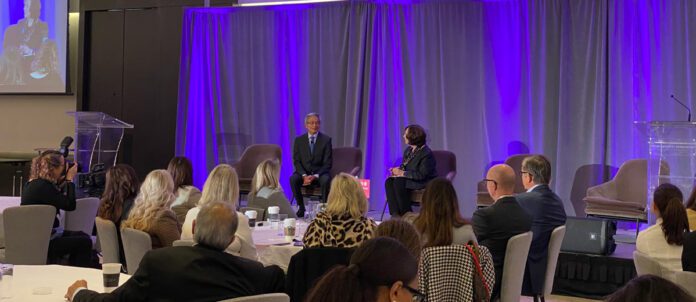By Amy Bostock, Nicole Di Tomasso and Roseline Victoria Vijayakumar
TORONTO — Nearly 300 foodservice-and-hospitality professionals gathered Monday at the Park Hyatt Toronto for the seventh-annual Women in Tourism and Hospitality (WITH) Summit.
“Today’s gathering represents a momentous occasion for us to come together annually to celebrate the remarkable achievements, the resilience and the boundless potential of women,” said WITH co-founder Rosanna Caira, editor and publisher at Kostuch Media Ltd. “As we know, the tourism and hospitality sectors have undergone significant transformations in the past three years. But it’s heartening to see continuing representation and leadership of women in this field. And it’s reassuring to see that the proportion of women on Canadian boards and executive office positions continues to increase as an encouraging rate. According to a recent report by Osler Hoskins, among 532 vacant, newly created board positions, a woman was chosen to fill it 45.3 per cent.”
Women now occupy 31.3 per cent of independent board seats on hotel public company boards in 2022, an increase from 22.5 per cent in 2021, shared Caira, adding that 67 per cent of directors who are new to a board in 2022 were women.
“Certainly, it’s encouraging to see progress, and it’s about time. Women have played an integral role in shaping this industry, but we’ve had to navigate through a traditionally male-dominated field. We’ve had to battle hard against stereotypes and biases, but we are moving the needle,” said Caira. “We know there’s a lot of work that needs to be done to ensure gender equality are uppermost in our collective goals. And that’s why we’re here today, to continue to challenge stereotypes, to break down barriers, and to help create an environment that fosters the growth and advancement of women.”
“As we delve into the dynamic landscape of business today, let’s not forget the critical mission of advancing diversity and inclusion in our industries,” said Anne Larcade, co-founder of WITH and president & CEO, Sequel Hotels. “It is mission rooted in fundamental justice and shared prosperity. By nurturing talents, we not only bolster the individual, but propel our entire global industry towards greatness. In a world where the power of diversity is increasingly recognized, this summit serves as a rallying cry for measurable change. We are on a mission to dismantle barriers, to shatter glass ceilings, to fill in the missing rungs, and to open doors for women from all walks of life.”
“The path to equality is not only a moral imperative, but it is also a strategic imperative,” she continued. “Research has shown, time and time again, that diverse teams drive innovation, foster creativity, and yield greater economic outcomes — there is a business case here. By recognizing and nurturing the talents of marginalized individuals, we are unlocking the potential for unparalleled growth within our industries.”
Fireside Chat
The day kicked off with a Fireside Chat between Dorothy Dowling, managing director at Horwath HTL, and David Kong, founder and principal at DEI Advisors. Kong shared his career journey as an immigrant who rose through the ranks from a dishwasher and busboy to becoming CEO of BWH Hotel Group for nearly 18 years.
“My parents were from Shanghai, China, and in the late ‘40s they fled to Hong Kong where they had four kids,” said Kong. “My parents had one goal and that was to work hard, save money and send their children abroad to further their education. From a young age, I learned the valuable lessons of unconditional love and work ethic.”
A graduate from the University of Hawaii, Kong began his hospitality career as a dishwasher, then busboy, then maître d’hôtel and eventually waiter at the Hilton Hawaiian Village Waikiki Beach Resort. He also spent time with Omni Hotels & Resorts as food-and-beverage director and Hyatt Hotels Corporation in various senior positions including executive assistant manager, regional food-and-beverage director and general manager before moving to the corporate office to head up the business process re-engineering efforts.
“What I’ve learned from that experience is it’s really easy to come up with good ideas, but it’s really hard to implement big changes,” said Kong. “It involves a cultural shift for people to embrace new ideas.”
He was then asked to join the Sales and Marketing department where he developed database marketing capabilities and launched the first Hyatt.com, winning USA Today’s Best Hotel Website award. Fast forward to 2001, Kong started working at Best Western Hotels & Resorts (now BWH Hotel Group). In three and a half years, Kong earned five promotions before becoming president & CEO of the company.
“I was lucky to be given the opportunity for all this exposure and the opportunity at Best Western, but I credit myself for taking a lot of risk along the way, taking jobs that nobody knew how to do and enriching myself through the process.”
Kong continued, “It’s important to work hard, but that alone is not going to get you ahead. I’m not diminishing the value of hard work, but if you want to move ahead, you have to find a way to differentiate yourself and a way to do that is through experiences,” said Kong. “A career is not a sprint, it’s a marathon.”
He also discussed the impetus to the founding of DEI Advisors, a non-profit organization that dedicated to helping women and other under-represented groups advance their careers through mentoring, coaching and podcasting.
“I was invited to participate in many CEO panels at hotel conferences and I’d be the only minority representation on the panels,” said Kong. “Of all these qualified people in the industry, why is it that every single CEO of a major hotel company is a white male? I wanted to do something about it.”
As a result, Kong said DEI Advisors is a way to empower others and encourage them to think strategically about their career by collecting learnings from accomplished leaders, both men and women, about personal improvement, such as how to avoid negative self-talk or how to network with attendees at industry events.
State of the Industry
Next up, Amy Bostock, managing editor at Kostuch Media Ltd., served as the moderator for the panel of industry stalwarts who discussed the state of the industry, touching on leading economic indicators, labour shortages, supply-chain issues, inflation and the future of travel. Panellists included Lisa Pierce, vice-president, Global Sales and Air Canada Vacations; Amanda Hite, president, STR; and Kelly Higginson, president and CEO, Restaurants Canada.
The panel discussed top challenges in the hotel industry, which included profit-margin pressure and development challenges such as high construction costs, labour shortages and supply constraints. Hite stated, “There’s a lot of debt coming due in the next year for hotel owners that they’re going to have to re-finance. Some will be able to re-finance, but it’s going to cut into their cash flow – in some cases by half. It’s a challenging environment for the foreseeable future as long as interest rates [remain] high.”
In the restaurant industry, challenges included profitability impact due to rising inflation and increased costs; changing consumer habits as more people order off-premises and make different menu choices which impact sales and profitability; and labour shortages exacerbated by the need for a large workforce. Higginson said, “We haven’t recovered. We’re managing high levels of debt. We have historic highs of $100 billion in sales, but then we’ve got the bottom line where 51 per cent of operators are operating in loss, which was 12 per cent pre-pandemic. So not only are they having significant profitability issues with every aspect of operations, insurance, utilities, food and wages, but they’ve also got extremely high levels of debt that were taken on throughout the pandemic and now rising interest rates.”
The panellists also expressed their views about the impact of the current geo-political climate on the travel, hotel-and-restaurant industries with efforts to adapt and find solutions to continue travel services, such as re-routing flights through different countries to reach destinations. “It’s a new normal,” said Pierce. “We’re still ahead of 2019, but we need to look at the fact that travel patterns are changing. What customers want, where they want to go and the reason they travel is changing.”
Higginson expressed optimism for the foodservice market in 2024, anticipating sales nearing $110 million. “We’re talking about bracing for the next six to 12 months as we see some of these challenges, but we do hope to continue to weather through and predict very healthy top-line sales,” she said.
Innovators and Champions
The WITH Innovators and Champions sessions featured two female leaders who have found new ways to address challenges in the travel-and-tourism industry.
Anne Marie Johns, GM at Fairmont Tremblant, talked about her hotel’s passion project: a collaboration with Ready, Willing & Able and Giant Steps Autism Centre on a pilot project to launch an autism inclusive hiring initiative at Fairmont Tremblant and Fairmont The Queen Elizabeth.
She touched on the potential and benefits of hiring autistic and neurodivergent individuals during the industry’s ongoing post-pandemic challenges of the labour shortage
“Adults on the spectrum bring incredible talent to the workplace,” said Johns. “They bring a different perspective, the strength of amazing concentration, great memories and high attention to detail. They’re reliable, they’re honest.”
Since launching the successful pilot 18 months ago, Johns said her teams now include three hires at The Fairmont Queen Elizabeth and two hires at Fairmont Tremblant as housekeepers, bellman and in the laundry department, as well as interns in human resources, talent and culture departments.
“I want to leave you with two really impactful statistics from our partners at Giant Steps. One of every 44 children are on the autistic spectrum and 86 per cent of [autistic] adults are unemployed. There is an opportunity to get these talented adults into our industry. They want to be productive; you just can’t hire them in the traditional way. You have to go slow, you have to understand it’s quality, not quantity, if you’re going to have success. So, remember that 86 per cent is our opportunity to get out there, find these gems, and really change their lives —for us really to change the world for them.”
In her session, Returning Humanity to The Supernatural, Felicia Snyder, co-founder and CEO of Arcana talked about how her concept is creating transformational experiences that shift perspective and inspire connection. Arcana, an innovative, experiential outdoor hospitality concept, was built in response to the mental-health crisis and the universal truth that spending time in nature is good for your wellbeing.
“There’s a lot of science that supports this,” said Snyder. “If we can all agree that feels good to spend time in nature, in the same breath, we need to acknowledge that we are facing a real mental-health crisis, with one in every two Canadians having had or having a mental illness by the age of 40. This includes anxiety and depression. And studies show that as many as 75 per cent of North Americans regularly feel stressed.”
She emphasized the word “feel” because she said it’s more than just a mental state. “Stress has real impact on your body, your cortisol levels rise, you have a faster heart rate, your blood pressure is elevated. And so Arcana was really born as the marriage of these two concepts. On the one hand, universal truth that spending time in nature feels good, and on the other a recognition that we have a mental-health crisis that unfortunately does not seem to be subsiding.”
From the architecturally striking cabins to the self-guided wellness experiences, the Arcana journey is designed to inspire exploration of the natural environment, our bond with community, and the endless journey of discovering ourselves.
“We really set out to build a destination where we can re-connect guests with nature,” said Snyder. “And that’s what we mean by return to the supernatural. We mean taking guests and bringing them back into a space where they can be reminded of the restorative properties that nature can provide.”
Innovations in Attending and Retaining Employees
The first morning workshop discussed the challenges operators are experiencing in the post-pandemic hospitality industry and highlighted unique and innovative approaches to hiring and retention. Moderated by Val Upfold, the panel featured Julie Farnsworth, senior VP, People & Culture, Crescent Hotels & Resorts; Tracey Kalimeris, VP, Talent & Culture, Fairmont Hotels & Resorts; and Steve Renard, founder & president, Renard International Hospitality Search Consultants. Together, the panellists discussed what their companies are doing to find new sources of labour supply; how they’re changing their workplaces and how they’re upgrading salary-and-benefits packages.
To help diversify the workplace, Farnsworth said Crescent Hotels & Resorts “has always been a proponent of hiring the best talent for the job regardless of gender, race, sexual orientation, et cetera. That said, 58 per cent of our general managers and 53 per cent of our total management workforce identifies as female,” adding that the company has leaned into community outreach through organizations such as Tent, which mobilizes major businesses to connect refugees to work and expose them to the hospitality industry.
“One thing [Fairmont Hotels & Resorts] has started to talk about is this notion of inclusivity,” said Kalimeris. “[The company] has been championing inclusivity training for about two years across all leadership to get them to think about what an inclusive workplace looks like.” She highlighted five barriers outlined in a company study from nearly four years ago that still ring true today, including perception of work-life balance, mobility challenges, lack of proper mentorship, perceptions of gaps in pay based on gender and general uncertainty on how to climb the corporate ladder.
From an international perspective, Renard said that Canadian hospitality industry is losing a lot of women to overseas positions, which is severely impacting recruitment and retention. “The number-1 country in the world that people like to hire from is Canada,” he said. We lose a lot of great talent, both female and male, to clients overseas who are looking for Canadians.”
In terms of refined recruitment tactics, Kalimeris said “the industry doesn’t leverage the resources it has at its fingertips. Maximize one simple thing such as LinkedIn. We’ve also seen huge success with pay transparency. We need to be better at communicating our compensation packages. We’re competitive but we just don’t promote it properly.”
The panel concluded with a discussion about job ads. “There’s a big difference between a job ad and a job description,” said Farnsworth. “Job ads are marketing, and we need to do a better job of marketing who we are. Right now, the job seeker, regardless of their age, background or gender, is looking for what a company can do for them and for others. It’s about culture and ensuring they understand the company’s corporate social responsibility. This is a critical piece that so many organizations have missed.”
Igniting Personal Growth
During the second morning breakout session, Anna Dowe, best-selling author, international speaker and high-performance sales coach, hosted a workshop focused on embracing stress to ignite personal growth.
Dowe shared her journey as a mother of two sons who are struggling with ADHD and communication disorders. She also discussed her relationship with her husband, John, who suffered from PTSD after retiring from the military. Despite their turbulent marriage, separation, reconciliation and the final decision to part ways, she wrote her best-selling book, Bent Not Broken: Find Your Power of Passion and Purpose, which focuses on empowering women who are dealing with partners with PTSD.
Using her personal life as a backdrop, Dowe discussed the social media facade where people present ideal lives, but behind the scenes deal with stress, broken marriages and other hardships. “It’s all about changing the perception of stress and using it as a catalyst rather than something that brings us down,” she said.
Additionally, Dowe explained that 90 per cent of brain activity occurs in the unconscious mind and the likelihood of pattern repetition unless consciously addressed. “If we don’t address the unconscious, we’re going to be doing the same thing over and over again and expect different results,” she emphasized.
Dowe also identified the importance of decision-making and urged listeners to make tough decisions and not succumb to fear. She stated, “People are afraid to make the tough decision because they want to make the right decision. So, they make no decision, which is a decision.”


















